Project Management Assignment 2022
VerifiedAdded on 2022/10/17
|12
|2356
|24
Assignment
AI Summary
Contribute Materials
Your contribution can guide someone’s learning journey. Share your
documents today.
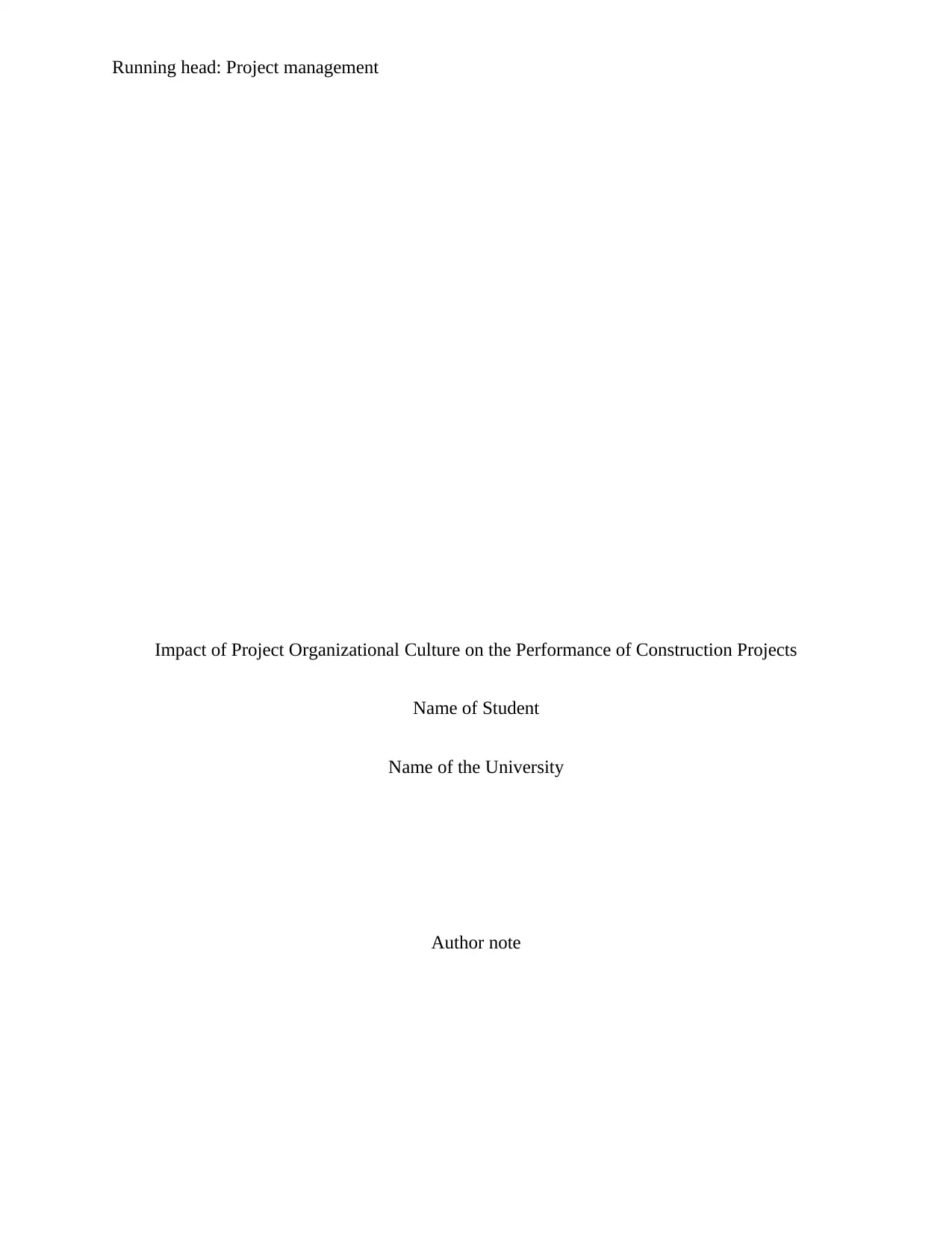
Running head: Project management
Impact of Project Organizational Culture on the Performance of Construction Projects
Name of Student
Name of the University
Author note
Impact of Project Organizational Culture on the Performance of Construction Projects
Name of Student
Name of the University
Author note
Secure Best Marks with AI Grader
Need help grading? Try our AI Grader for instant feedback on your assignments.
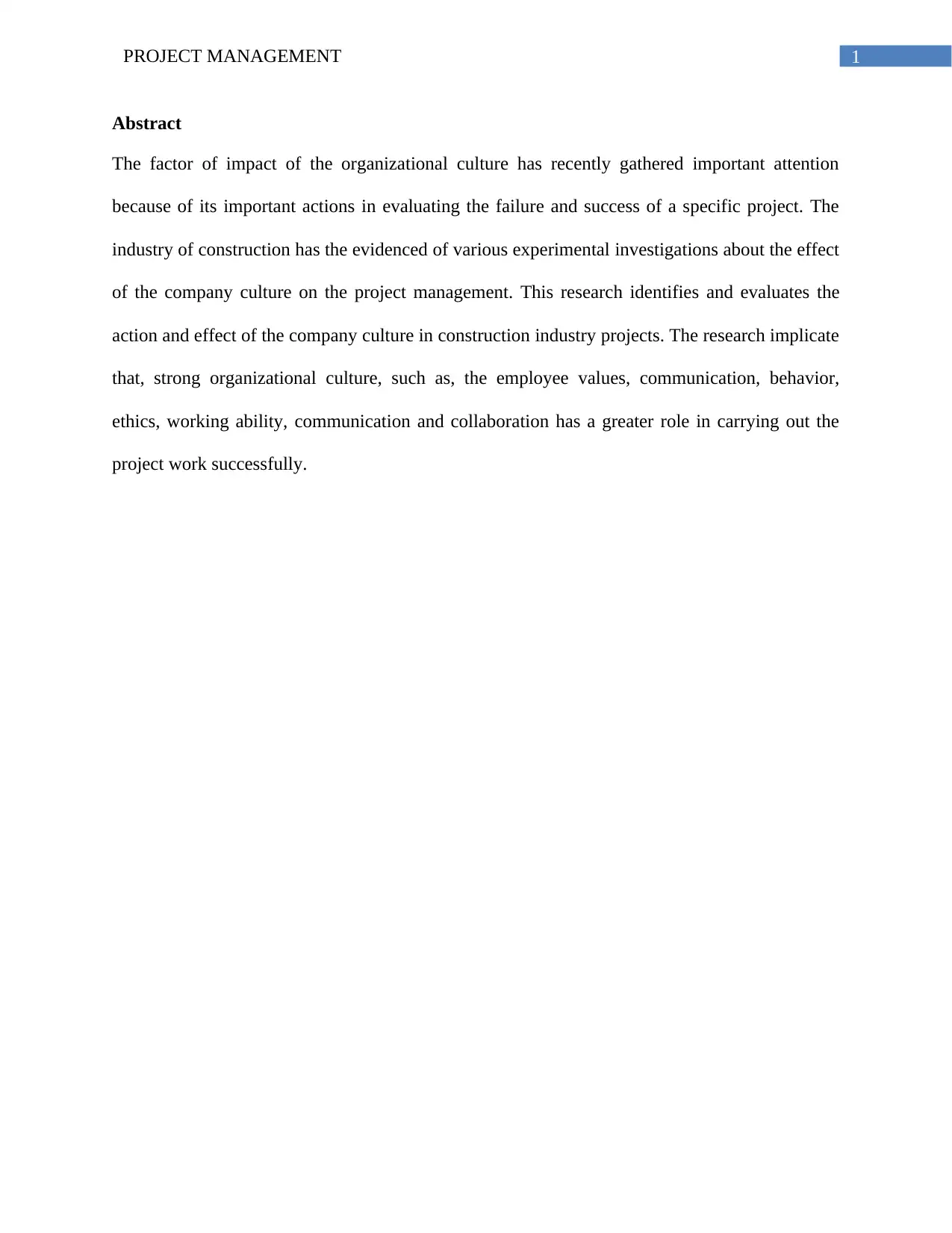
1PROJECT MANAGEMENT
Abstract
The factor of impact of the organizational culture has recently gathered important attention
because of its important actions in evaluating the failure and success of a specific project. The
industry of construction has the evidenced of various experimental investigations about the effect
of the company culture on the project management. This research identifies and evaluates the
action and effect of the company culture in construction industry projects. The research implicate
that, strong organizational culture, such as, the employee values, communication, behavior,
ethics, working ability, communication and collaboration has a greater role in carrying out the
project work successfully.
Abstract
The factor of impact of the organizational culture has recently gathered important attention
because of its important actions in evaluating the failure and success of a specific project. The
industry of construction has the evidenced of various experimental investigations about the effect
of the company culture on the project management. This research identifies and evaluates the
action and effect of the company culture in construction industry projects. The research implicate
that, strong organizational culture, such as, the employee values, communication, behavior,
ethics, working ability, communication and collaboration has a greater role in carrying out the
project work successfully.
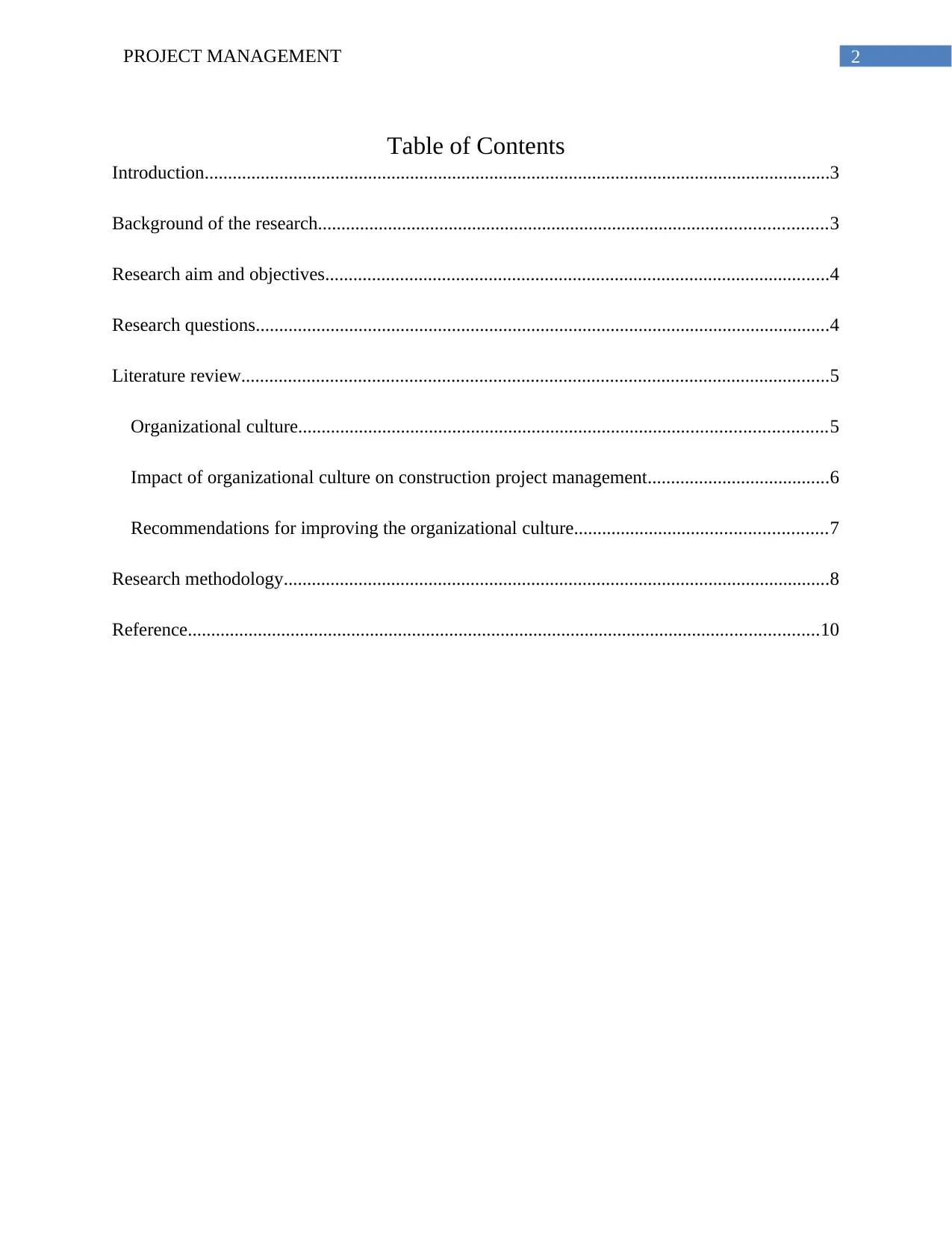
2PROJECT MANAGEMENT
Table of Contents
Introduction......................................................................................................................................3
Background of the research.............................................................................................................3
Research aim and objectives............................................................................................................4
Research questions...........................................................................................................................4
Literature review..............................................................................................................................5
Organizational culture.................................................................................................................5
Impact of organizational culture on construction project management.......................................6
Recommendations for improving the organizational culture......................................................7
Research methodology.....................................................................................................................8
Reference.......................................................................................................................................10
Table of Contents
Introduction......................................................................................................................................3
Background of the research.............................................................................................................3
Research aim and objectives............................................................................................................4
Research questions...........................................................................................................................4
Literature review..............................................................................................................................5
Organizational culture.................................................................................................................5
Impact of organizational culture on construction project management.......................................6
Recommendations for improving the organizational culture......................................................7
Research methodology.....................................................................................................................8
Reference.......................................................................................................................................10
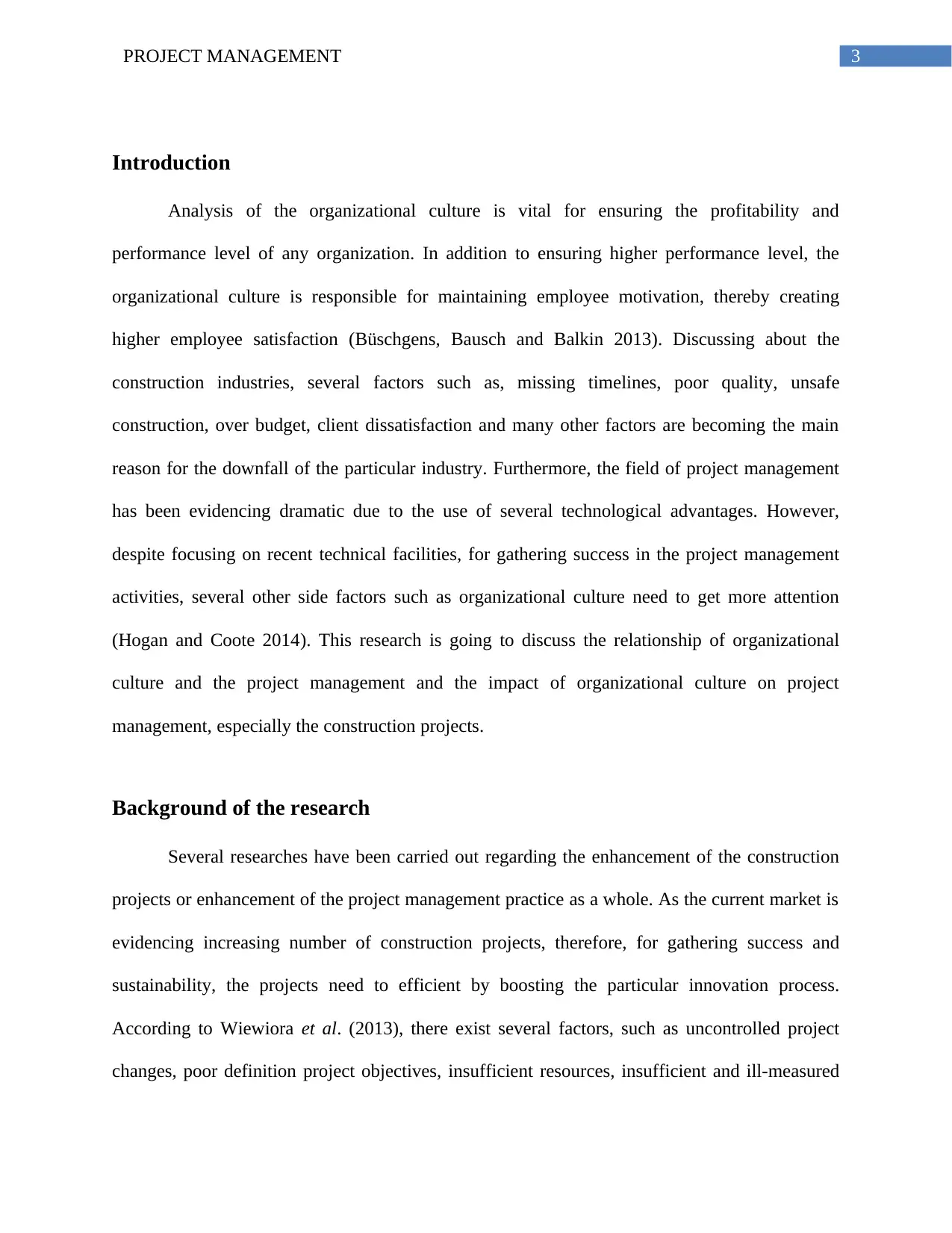
3PROJECT MANAGEMENT
Introduction
Analysis of the organizational culture is vital for ensuring the profitability and
performance level of any organization. In addition to ensuring higher performance level, the
organizational culture is responsible for maintaining employee motivation, thereby creating
higher employee satisfaction (Büschgens, Bausch and Balkin 2013). Discussing about the
construction industries, several factors such as, missing timelines, poor quality, unsafe
construction, over budget, client dissatisfaction and many other factors are becoming the main
reason for the downfall of the particular industry. Furthermore, the field of project management
has been evidencing dramatic due to the use of several technological advantages. However,
despite focusing on recent technical facilities, for gathering success in the project management
activities, several other side factors such as organizational culture need to get more attention
(Hogan and Coote 2014). This research is going to discuss the relationship of organizational
culture and the project management and the impact of organizational culture on project
management, especially the construction projects.
Background of the research
Several researches have been carried out regarding the enhancement of the construction
projects or enhancement of the project management practice as a whole. As the current market is
evidencing increasing number of construction projects, therefore, for gathering success and
sustainability, the projects need to efficient by boosting the particular innovation process.
According to Wiewiora et al. (2013), there exist several factors, such as uncontrolled project
changes, poor definition project objectives, insufficient resources, insufficient and ill-measured
Introduction
Analysis of the organizational culture is vital for ensuring the profitability and
performance level of any organization. In addition to ensuring higher performance level, the
organizational culture is responsible for maintaining employee motivation, thereby creating
higher employee satisfaction (Büschgens, Bausch and Balkin 2013). Discussing about the
construction industries, several factors such as, missing timelines, poor quality, unsafe
construction, over budget, client dissatisfaction and many other factors are becoming the main
reason for the downfall of the particular industry. Furthermore, the field of project management
has been evidencing dramatic due to the use of several technological advantages. However,
despite focusing on recent technical facilities, for gathering success in the project management
activities, several other side factors such as organizational culture need to get more attention
(Hogan and Coote 2014). This research is going to discuss the relationship of organizational
culture and the project management and the impact of organizational culture on project
management, especially the construction projects.
Background of the research
Several researches have been carried out regarding the enhancement of the construction
projects or enhancement of the project management practice as a whole. As the current market is
evidencing increasing number of construction projects, therefore, for gathering success and
sustainability, the projects need to efficient by boosting the particular innovation process.
According to Wiewiora et al. (2013), there exist several factors, such as uncontrolled project
changes, poor definition project objectives, insufficient resources, insufficient and ill-measured
Secure Best Marks with AI Grader
Need help grading? Try our AI Grader for instant feedback on your assignments.
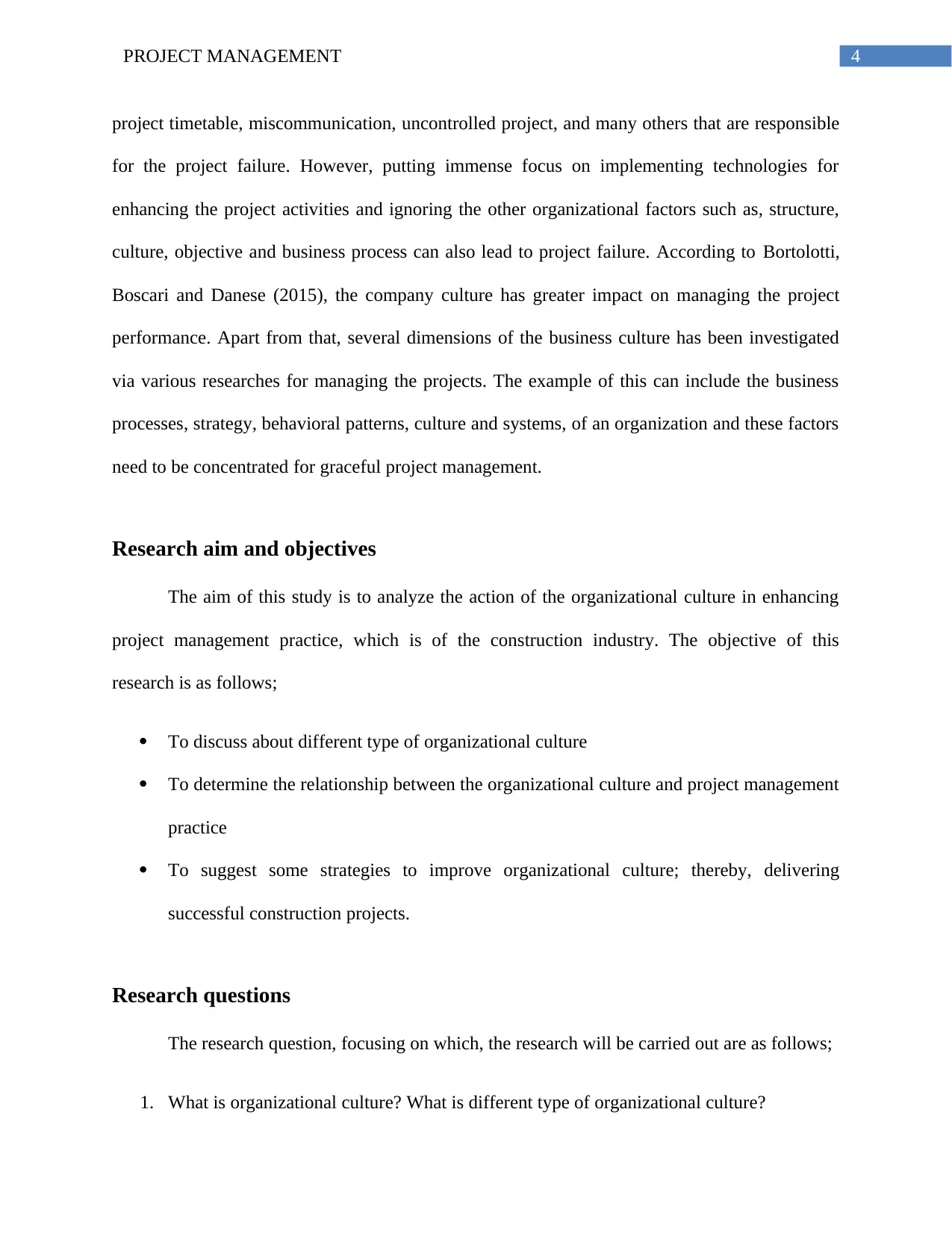
4PROJECT MANAGEMENT
project timetable, miscommunication, uncontrolled project, and many others that are responsible
for the project failure. However, putting immense focus on implementing technologies for
enhancing the project activities and ignoring the other organizational factors such as, structure,
culture, objective and business process can also lead to project failure. According to Bortolotti,
Boscari and Danese (2015), the company culture has greater impact on managing the project
performance. Apart from that, several dimensions of the business culture has been investigated
via various researches for managing the projects. The example of this can include the business
processes, strategy, behavioral patterns, culture and systems, of an organization and these factors
need to be concentrated for graceful project management.
Research aim and objectives
The aim of this study is to analyze the action of the organizational culture in enhancing
project management practice, which is of the construction industry. The objective of this
research is as follows;
To discuss about different type of organizational culture
To determine the relationship between the organizational culture and project management
practice
To suggest some strategies to improve organizational culture; thereby, delivering
successful construction projects.
Research questions
The research question, focusing on which, the research will be carried out are as follows;
1. What is organizational culture? What is different type of organizational culture?
project timetable, miscommunication, uncontrolled project, and many others that are responsible
for the project failure. However, putting immense focus on implementing technologies for
enhancing the project activities and ignoring the other organizational factors such as, structure,
culture, objective and business process can also lead to project failure. According to Bortolotti,
Boscari and Danese (2015), the company culture has greater impact on managing the project
performance. Apart from that, several dimensions of the business culture has been investigated
via various researches for managing the projects. The example of this can include the business
processes, strategy, behavioral patterns, culture and systems, of an organization and these factors
need to be concentrated for graceful project management.
Research aim and objectives
The aim of this study is to analyze the action of the organizational culture in enhancing
project management practice, which is of the construction industry. The objective of this
research is as follows;
To discuss about different type of organizational culture
To determine the relationship between the organizational culture and project management
practice
To suggest some strategies to improve organizational culture; thereby, delivering
successful construction projects.
Research questions
The research question, focusing on which, the research will be carried out are as follows;
1. What is organizational culture? What is different type of organizational culture?
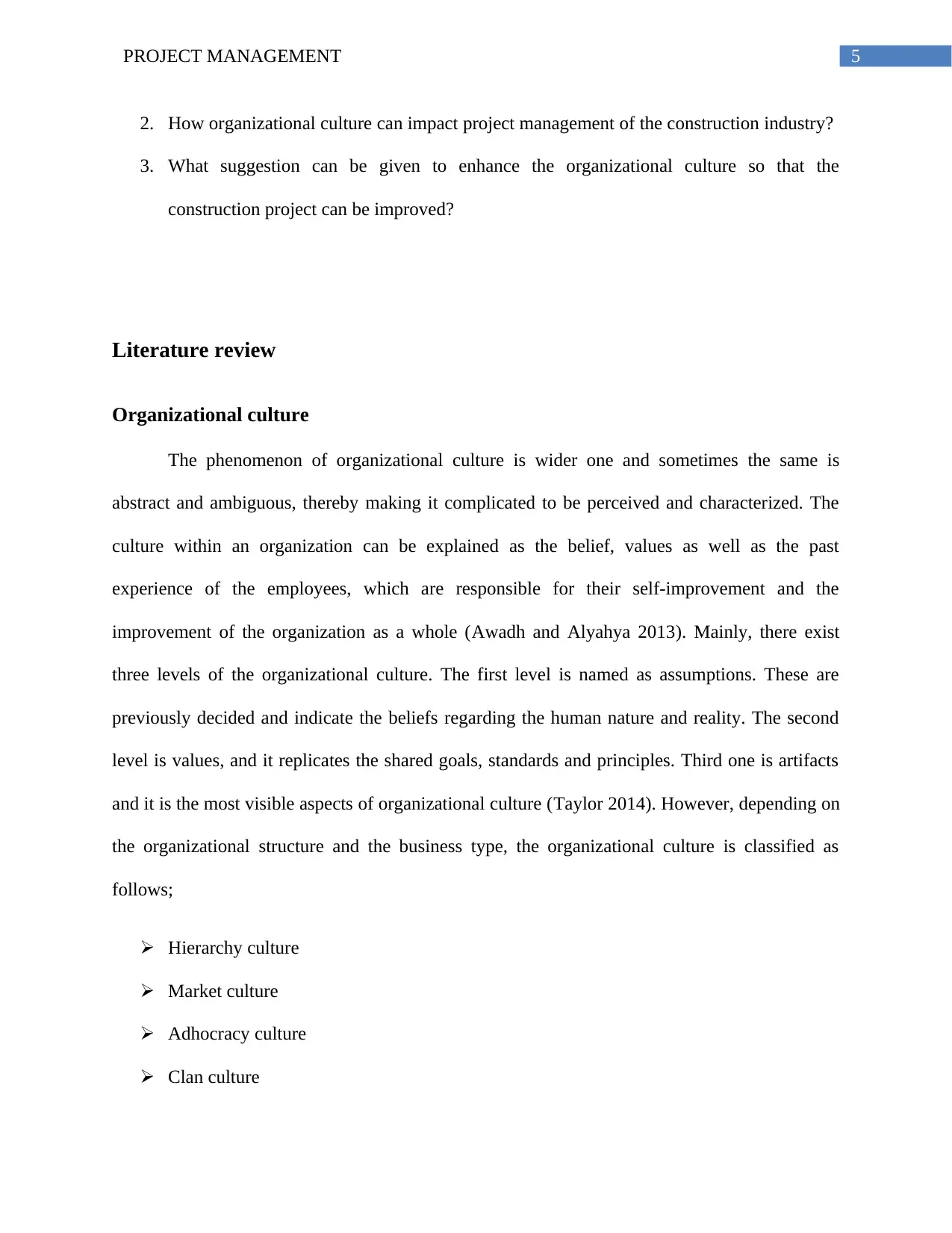
5PROJECT MANAGEMENT
2. How organizational culture can impact project management of the construction industry?
3. What suggestion can be given to enhance the organizational culture so that the
construction project can be improved?
Literature review
Organizational culture
The phenomenon of organizational culture is wider one and sometimes the same is
abstract and ambiguous, thereby making it complicated to be perceived and characterized. The
culture within an organization can be explained as the belief, values as well as the past
experience of the employees, which are responsible for their self-improvement and the
improvement of the organization as a whole (Awadh and Alyahya 2013). Mainly, there exist
three levels of the organizational culture. The first level is named as assumptions. These are
previously decided and indicate the beliefs regarding the human nature and reality. The second
level is values, and it replicates the shared goals, standards and principles. Third one is artifacts
and it is the most visible aspects of organizational culture (Taylor 2014). However, depending on
the organizational structure and the business type, the organizational culture is classified as
follows;
Hierarchy culture
Market culture
Adhocracy culture
Clan culture
2. How organizational culture can impact project management of the construction industry?
3. What suggestion can be given to enhance the organizational culture so that the
construction project can be improved?
Literature review
Organizational culture
The phenomenon of organizational culture is wider one and sometimes the same is
abstract and ambiguous, thereby making it complicated to be perceived and characterized. The
culture within an organization can be explained as the belief, values as well as the past
experience of the employees, which are responsible for their self-improvement and the
improvement of the organization as a whole (Awadh and Alyahya 2013). Mainly, there exist
three levels of the organizational culture. The first level is named as assumptions. These are
previously decided and indicate the beliefs regarding the human nature and reality. The second
level is values, and it replicates the shared goals, standards and principles. Third one is artifacts
and it is the most visible aspects of organizational culture (Taylor 2014). However, depending on
the organizational structure and the business type, the organizational culture is classified as
follows;
Hierarchy culture
Market culture
Adhocracy culture
Clan culture
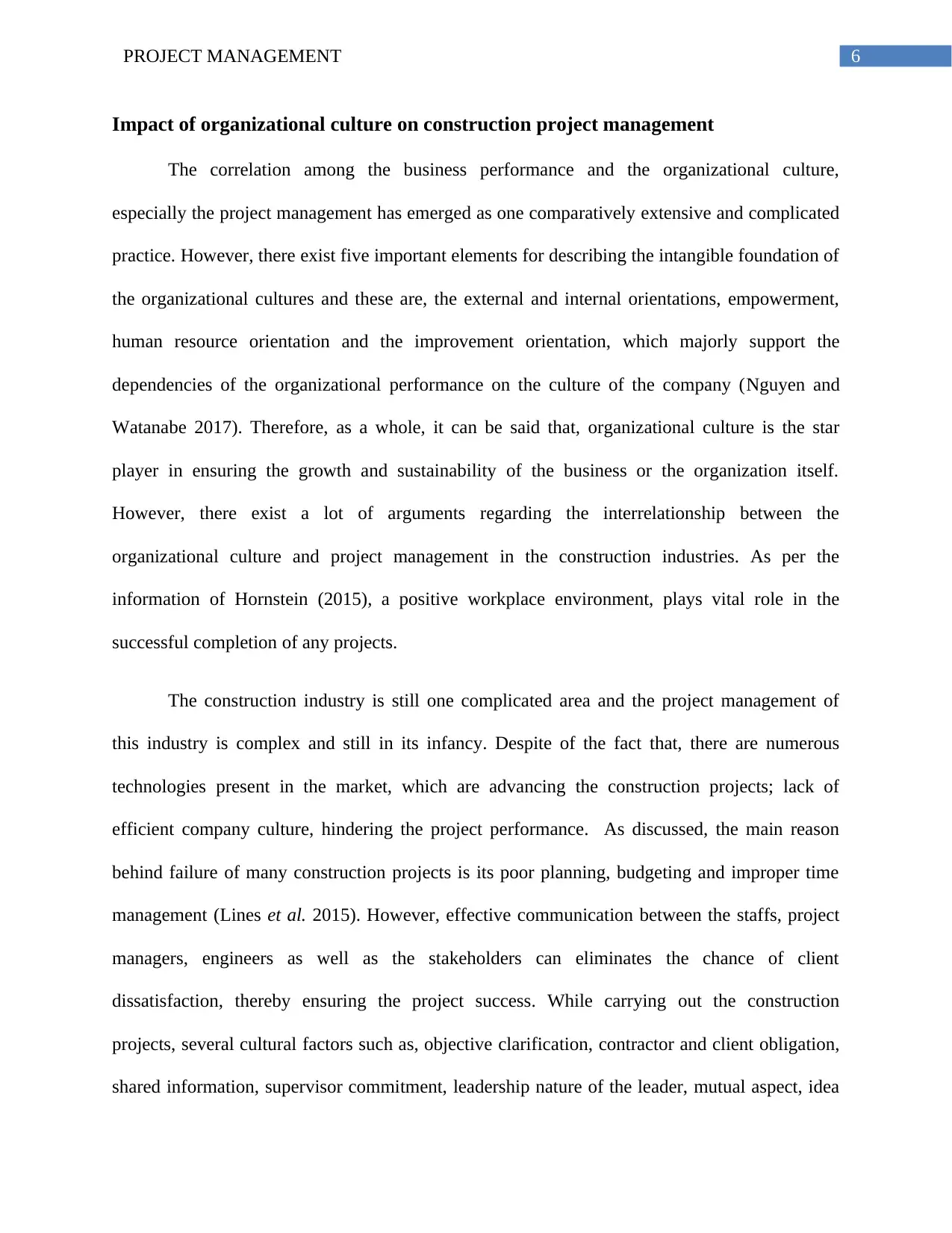
6PROJECT MANAGEMENT
Impact of organizational culture on construction project management
The correlation among the business performance and the organizational culture,
especially the project management has emerged as one comparatively extensive and complicated
practice. However, there exist five important elements for describing the intangible foundation of
the organizational cultures and these are, the external and internal orientations, empowerment,
human resource orientation and the improvement orientation, which majorly support the
dependencies of the organizational performance on the culture of the company (Nguyen and
Watanabe 2017). Therefore, as a whole, it can be said that, organizational culture is the star
player in ensuring the growth and sustainability of the business or the organization itself.
However, there exist a lot of arguments regarding the interrelationship between the
organizational culture and project management in the construction industries. As per the
information of Hornstein (2015), a positive workplace environment, plays vital role in the
successful completion of any projects.
The construction industry is still one complicated area and the project management of
this industry is complex and still in its infancy. Despite of the fact that, there are numerous
technologies present in the market, which are advancing the construction projects; lack of
efficient company culture, hindering the project performance. As discussed, the main reason
behind failure of many construction projects is its poor planning, budgeting and improper time
management (Lines et al. 2015). However, effective communication between the staffs, project
managers, engineers as well as the stakeholders can eliminates the chance of client
dissatisfaction, thereby ensuring the project success. While carrying out the construction
projects, several cultural factors such as, objective clarification, contractor and client obligation,
shared information, supervisor commitment, leadership nature of the leader, mutual aspect, idea
Impact of organizational culture on construction project management
The correlation among the business performance and the organizational culture,
especially the project management has emerged as one comparatively extensive and complicated
practice. However, there exist five important elements for describing the intangible foundation of
the organizational cultures and these are, the external and internal orientations, empowerment,
human resource orientation and the improvement orientation, which majorly support the
dependencies of the organizational performance on the culture of the company (Nguyen and
Watanabe 2017). Therefore, as a whole, it can be said that, organizational culture is the star
player in ensuring the growth and sustainability of the business or the organization itself.
However, there exist a lot of arguments regarding the interrelationship between the
organizational culture and project management in the construction industries. As per the
information of Hornstein (2015), a positive workplace environment, plays vital role in the
successful completion of any projects.
The construction industry is still one complicated area and the project management of
this industry is complex and still in its infancy. Despite of the fact that, there are numerous
technologies present in the market, which are advancing the construction projects; lack of
efficient company culture, hindering the project performance. As discussed, the main reason
behind failure of many construction projects is its poor planning, budgeting and improper time
management (Lines et al. 2015). However, effective communication between the staffs, project
managers, engineers as well as the stakeholders can eliminates the chance of client
dissatisfaction, thereby ensuring the project success. While carrying out the construction
projects, several cultural factors such as, objective clarification, contractor and client obligation,
shared information, supervisor commitment, leadership nature of the leader, mutual aspect, idea
Paraphrase This Document
Need a fresh take? Get an instant paraphrase of this document with our AI Paraphraser
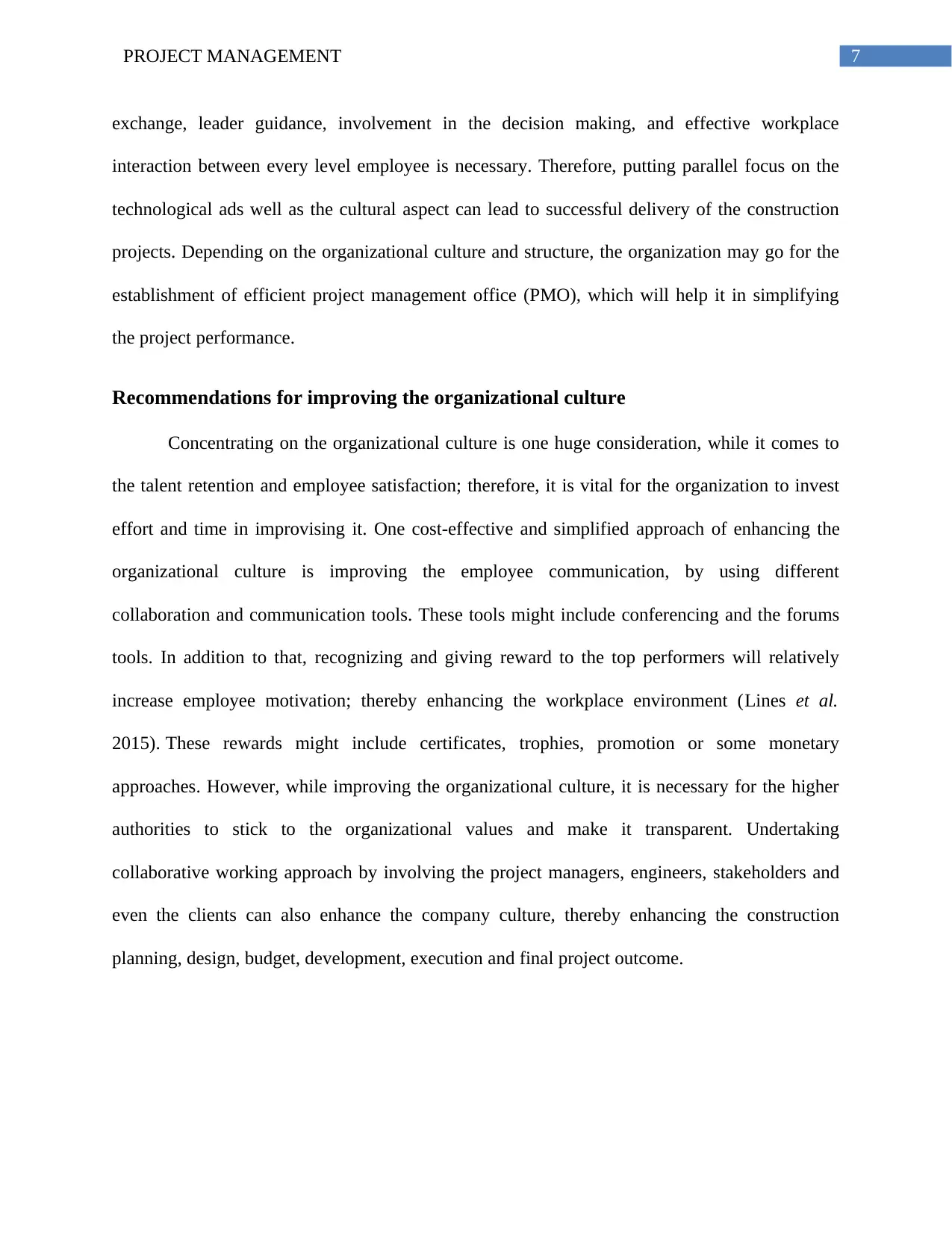
7PROJECT MANAGEMENT
exchange, leader guidance, involvement in the decision making, and effective workplace
interaction between every level employee is necessary. Therefore, putting parallel focus on the
technological ads well as the cultural aspect can lead to successful delivery of the construction
projects. Depending on the organizational culture and structure, the organization may go for the
establishment of efficient project management office (PMO), which will help it in simplifying
the project performance.
Recommendations for improving the organizational culture
Concentrating on the organizational culture is one huge consideration, while it comes to
the talent retention and employee satisfaction; therefore, it is vital for the organization to invest
effort and time in improvising it. One cost-effective and simplified approach of enhancing the
organizational culture is improving the employee communication, by using different
collaboration and communication tools. These tools might include conferencing and the forums
tools. In addition to that, recognizing and giving reward to the top performers will relatively
increase employee motivation; thereby enhancing the workplace environment (Lines et al.
2015). These rewards might include certificates, trophies, promotion or some monetary
approaches. However, while improving the organizational culture, it is necessary for the higher
authorities to stick to the organizational values and make it transparent. Undertaking
collaborative working approach by involving the project managers, engineers, stakeholders and
even the clients can also enhance the company culture, thereby enhancing the construction
planning, design, budget, development, execution and final project outcome.
exchange, leader guidance, involvement in the decision making, and effective workplace
interaction between every level employee is necessary. Therefore, putting parallel focus on the
technological ads well as the cultural aspect can lead to successful delivery of the construction
projects. Depending on the organizational culture and structure, the organization may go for the
establishment of efficient project management office (PMO), which will help it in simplifying
the project performance.
Recommendations for improving the organizational culture
Concentrating on the organizational culture is one huge consideration, while it comes to
the talent retention and employee satisfaction; therefore, it is vital for the organization to invest
effort and time in improvising it. One cost-effective and simplified approach of enhancing the
organizational culture is improving the employee communication, by using different
collaboration and communication tools. These tools might include conferencing and the forums
tools. In addition to that, recognizing and giving reward to the top performers will relatively
increase employee motivation; thereby enhancing the workplace environment (Lines et al.
2015). These rewards might include certificates, trophies, promotion or some monetary
approaches. However, while improving the organizational culture, it is necessary for the higher
authorities to stick to the organizational values and make it transparent. Undertaking
collaborative working approach by involving the project managers, engineers, stakeholders and
even the clients can also enhance the company culture, thereby enhancing the construction
planning, design, budget, development, execution and final project outcome.
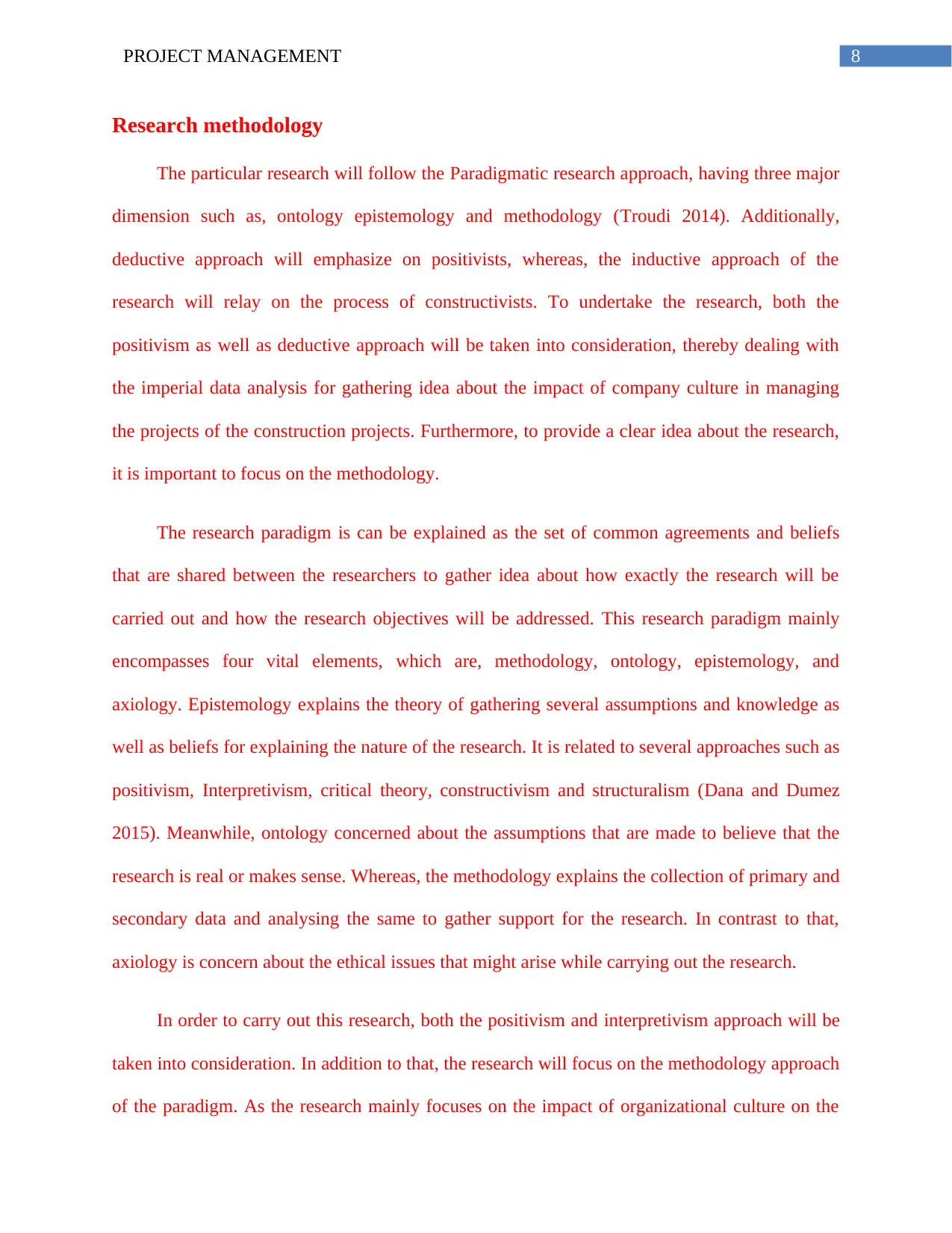
8PROJECT MANAGEMENT
Research methodology
The particular research will follow the Paradigmatic research approach, having three major
dimension such as, ontology epistemology and methodology (Troudi 2014). Additionally,
deductive approach will emphasize on positivists, whereas, the inductive approach of the
research will relay on the process of constructivists. To undertake the research, both the
positivism as well as deductive approach will be taken into consideration, thereby dealing with
the imperial data analysis for gathering idea about the impact of company culture in managing
the projects of the construction projects. Furthermore, to provide a clear idea about the research,
it is important to focus on the methodology.
The research paradigm is can be explained as the set of common agreements and beliefs
that are shared between the researchers to gather idea about how exactly the research will be
carried out and how the research objectives will be addressed. This research paradigm mainly
encompasses four vital elements, which are, methodology, ontology, epistemology, and
axiology. Epistemology explains the theory of gathering several assumptions and knowledge as
well as beliefs for explaining the nature of the research. It is related to several approaches such as
positivism, Interpretivism, critical theory, constructivism and structuralism (Dana and Dumez
2015). Meanwhile, ontology concerned about the assumptions that are made to believe that the
research is real or makes sense. Whereas, the methodology explains the collection of primary and
secondary data and analysing the same to gather support for the research. In contrast to that,
axiology is concern about the ethical issues that might arise while carrying out the research.
In order to carry out this research, both the positivism and interpretivism approach will be
taken into consideration. In addition to that, the research will focus on the methodology approach
of the paradigm. As the research mainly focuses on the impact of organizational culture on the
Research methodology
The particular research will follow the Paradigmatic research approach, having three major
dimension such as, ontology epistemology and methodology (Troudi 2014). Additionally,
deductive approach will emphasize on positivists, whereas, the inductive approach of the
research will relay on the process of constructivists. To undertake the research, both the
positivism as well as deductive approach will be taken into consideration, thereby dealing with
the imperial data analysis for gathering idea about the impact of company culture in managing
the projects of the construction projects. Furthermore, to provide a clear idea about the research,
it is important to focus on the methodology.
The research paradigm is can be explained as the set of common agreements and beliefs
that are shared between the researchers to gather idea about how exactly the research will be
carried out and how the research objectives will be addressed. This research paradigm mainly
encompasses four vital elements, which are, methodology, ontology, epistemology, and
axiology. Epistemology explains the theory of gathering several assumptions and knowledge as
well as beliefs for explaining the nature of the research. It is related to several approaches such as
positivism, Interpretivism, critical theory, constructivism and structuralism (Dana and Dumez
2015). Meanwhile, ontology concerned about the assumptions that are made to believe that the
research is real or makes sense. Whereas, the methodology explains the collection of primary and
secondary data and analysing the same to gather support for the research. In contrast to that,
axiology is concern about the ethical issues that might arise while carrying out the research.
In order to carry out this research, both the positivism and interpretivism approach will be
taken into consideration. In addition to that, the research will focus on the methodology approach
of the paradigm. As the research mainly focuses on the impact of organizational culture on the
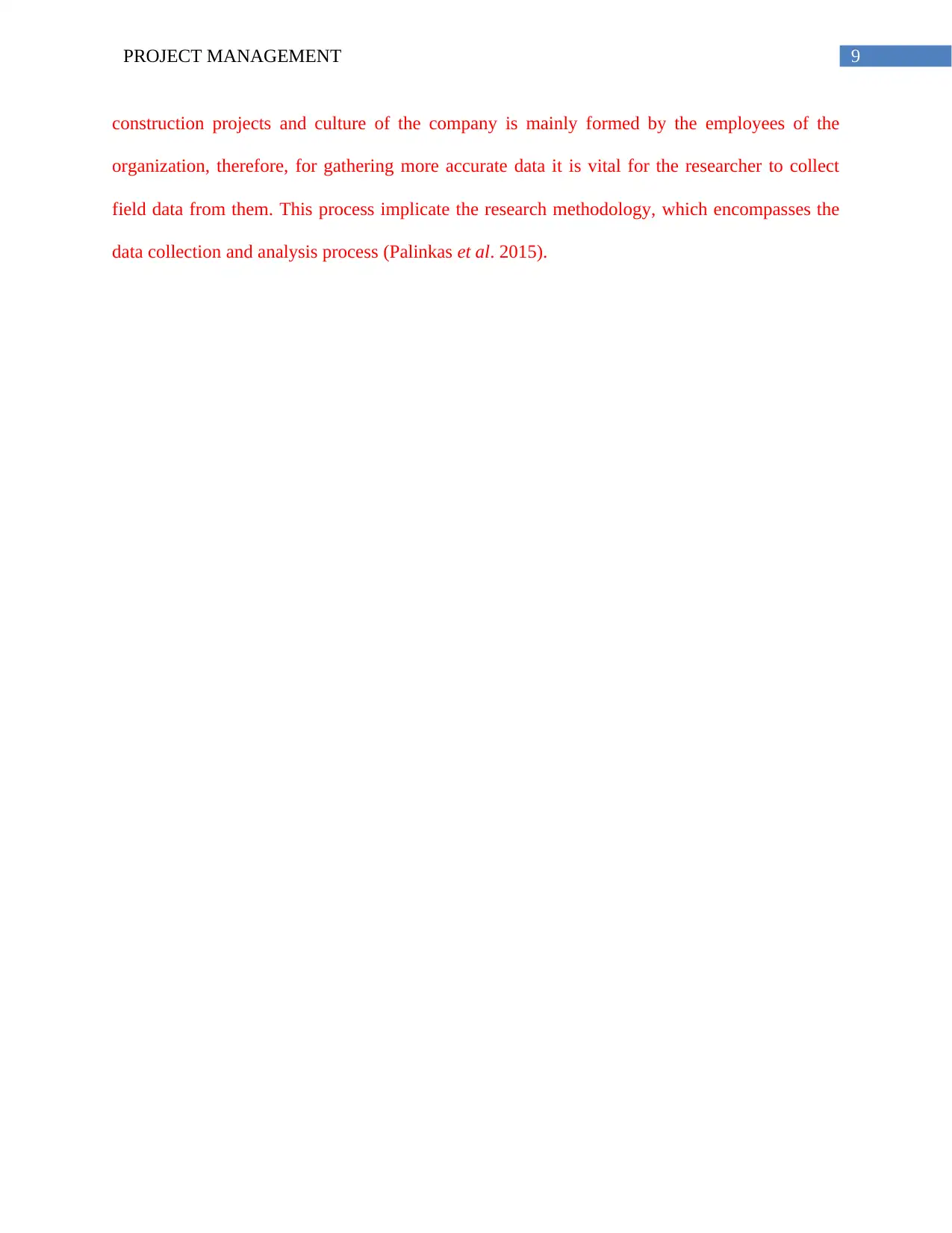
9PROJECT MANAGEMENT
construction projects and culture of the company is mainly formed by the employees of the
organization, therefore, for gathering more accurate data it is vital for the researcher to collect
field data from them. This process implicate the research methodology, which encompasses the
data collection and analysis process (Palinkas et al. 2015).
construction projects and culture of the company is mainly formed by the employees of the
organization, therefore, for gathering more accurate data it is vital for the researcher to collect
field data from them. This process implicate the research methodology, which encompasses the
data collection and analysis process (Palinkas et al. 2015).
Secure Best Marks with AI Grader
Need help grading? Try our AI Grader for instant feedback on your assignments.
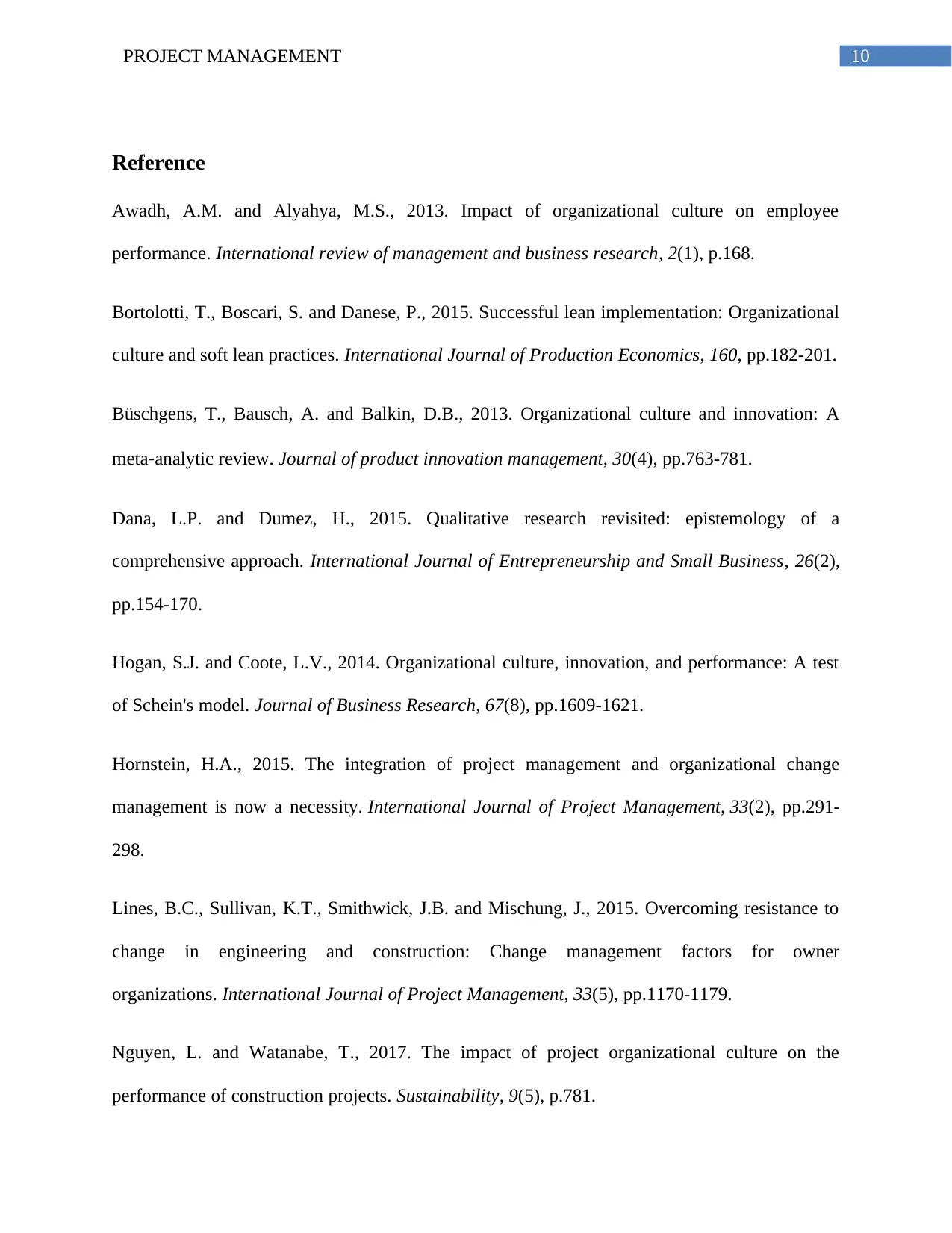
10PROJECT MANAGEMENT
Reference
Awadh, A.M. and Alyahya, M.S., 2013. Impact of organizational culture on employee
performance. International review of management and business research, 2(1), p.168.
Bortolotti, T., Boscari, S. and Danese, P., 2015. Successful lean implementation: Organizational
culture and soft lean practices. International Journal of Production Economics, 160, pp.182-201.
Büschgens, T., Bausch, A. and Balkin, D.B., 2013. Organizational culture and innovation: A
meta‐analytic review. Journal of product innovation management, 30(4), pp.763-781.
Dana, L.P. and Dumez, H., 2015. Qualitative research revisited: epistemology of a
comprehensive approach. International Journal of Entrepreneurship and Small Business, 26(2),
pp.154-170.
Hogan, S.J. and Coote, L.V., 2014. Organizational culture, innovation, and performance: A test
of Schein's model. Journal of Business Research, 67(8), pp.1609-1621.
Hornstein, H.A., 2015. The integration of project management and organizational change
management is now a necessity. International Journal of Project Management, 33(2), pp.291-
298.
Lines, B.C., Sullivan, K.T., Smithwick, J.B. and Mischung, J., 2015. Overcoming resistance to
change in engineering and construction: Change management factors for owner
organizations. International Journal of Project Management, 33(5), pp.1170-1179.
Nguyen, L. and Watanabe, T., 2017. The impact of project organizational culture on the
performance of construction projects. Sustainability, 9(5), p.781.
Reference
Awadh, A.M. and Alyahya, M.S., 2013. Impact of organizational culture on employee
performance. International review of management and business research, 2(1), p.168.
Bortolotti, T., Boscari, S. and Danese, P., 2015. Successful lean implementation: Organizational
culture and soft lean practices. International Journal of Production Economics, 160, pp.182-201.
Büschgens, T., Bausch, A. and Balkin, D.B., 2013. Organizational culture and innovation: A
meta‐analytic review. Journal of product innovation management, 30(4), pp.763-781.
Dana, L.P. and Dumez, H., 2015. Qualitative research revisited: epistemology of a
comprehensive approach. International Journal of Entrepreneurship and Small Business, 26(2),
pp.154-170.
Hogan, S.J. and Coote, L.V., 2014. Organizational culture, innovation, and performance: A test
of Schein's model. Journal of Business Research, 67(8), pp.1609-1621.
Hornstein, H.A., 2015. The integration of project management and organizational change
management is now a necessity. International Journal of Project Management, 33(2), pp.291-
298.
Lines, B.C., Sullivan, K.T., Smithwick, J.B. and Mischung, J., 2015. Overcoming resistance to
change in engineering and construction: Change management factors for owner
organizations. International Journal of Project Management, 33(5), pp.1170-1179.
Nguyen, L. and Watanabe, T., 2017. The impact of project organizational culture on the
performance of construction projects. Sustainability, 9(5), p.781.
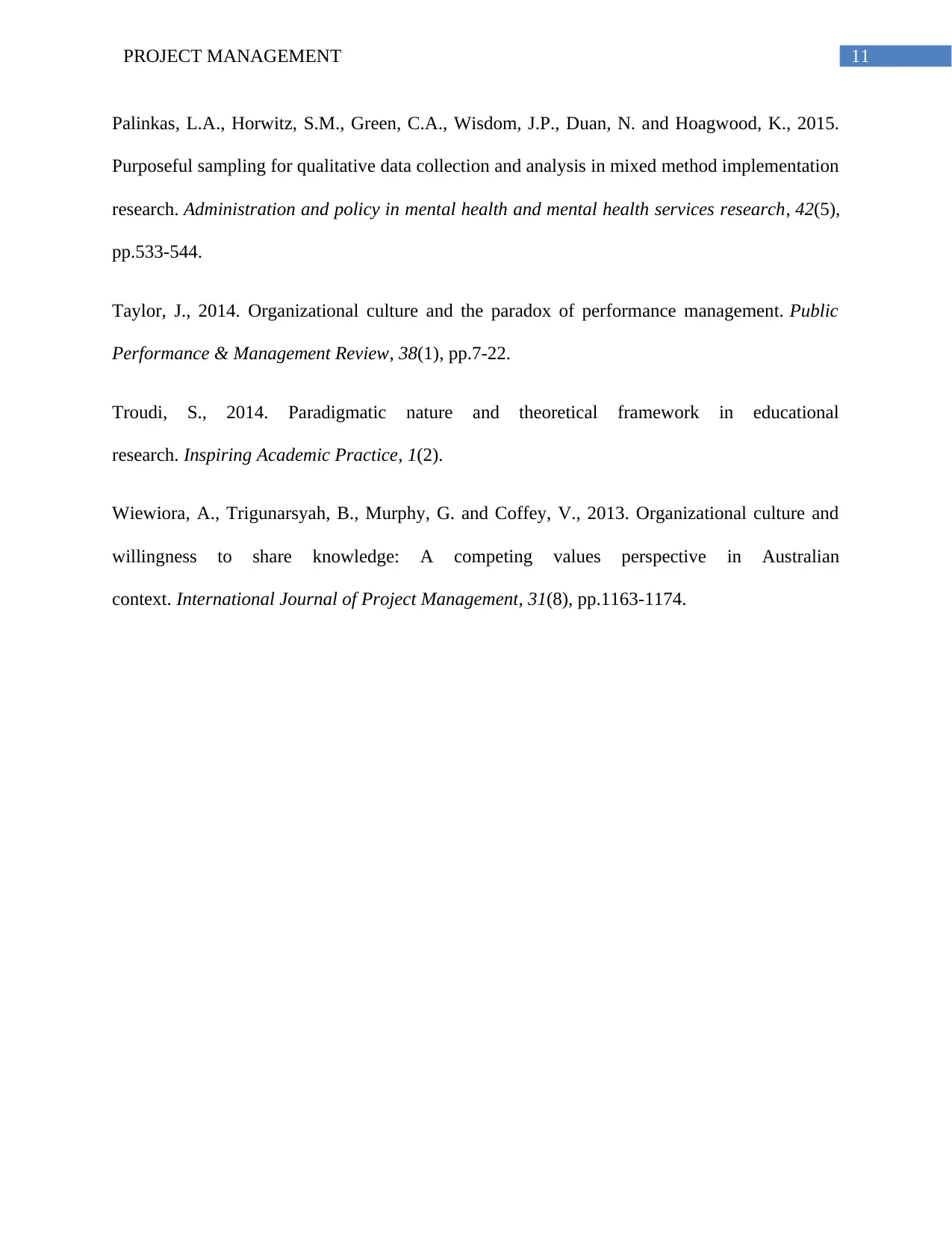
11PROJECT MANAGEMENT
Palinkas, L.A., Horwitz, S.M., Green, C.A., Wisdom, J.P., Duan, N. and Hoagwood, K., 2015.
Purposeful sampling for qualitative data collection and analysis in mixed method implementation
research. Administration and policy in mental health and mental health services research, 42(5),
pp.533-544.
Taylor, J., 2014. Organizational culture and the paradox of performance management. Public
Performance & Management Review, 38(1), pp.7-22.
Troudi, S., 2014. Paradigmatic nature and theoretical framework in educational
research. Inspiring Academic Practice, 1(2).
Wiewiora, A., Trigunarsyah, B., Murphy, G. and Coffey, V., 2013. Organizational culture and
willingness to share knowledge: A competing values perspective in Australian
context. International Journal of Project Management, 31(8), pp.1163-1174.
Palinkas, L.A., Horwitz, S.M., Green, C.A., Wisdom, J.P., Duan, N. and Hoagwood, K., 2015.
Purposeful sampling for qualitative data collection and analysis in mixed method implementation
research. Administration and policy in mental health and mental health services research, 42(5),
pp.533-544.
Taylor, J., 2014. Organizational culture and the paradox of performance management. Public
Performance & Management Review, 38(1), pp.7-22.
Troudi, S., 2014. Paradigmatic nature and theoretical framework in educational
research. Inspiring Academic Practice, 1(2).
Wiewiora, A., Trigunarsyah, B., Murphy, G. and Coffey, V., 2013. Organizational culture and
willingness to share knowledge: A competing values perspective in Australian
context. International Journal of Project Management, 31(8), pp.1163-1174.
1 out of 12
Related Documents
Your All-in-One AI-Powered Toolkit for Academic Success.
+13062052269
info@desklib.com
Available 24*7 on WhatsApp / Email
![[object Object]](/_next/static/media/star-bottom.7253800d.svg)
Unlock your academic potential
© 2024 | Zucol Services PVT LTD | All rights reserved.





